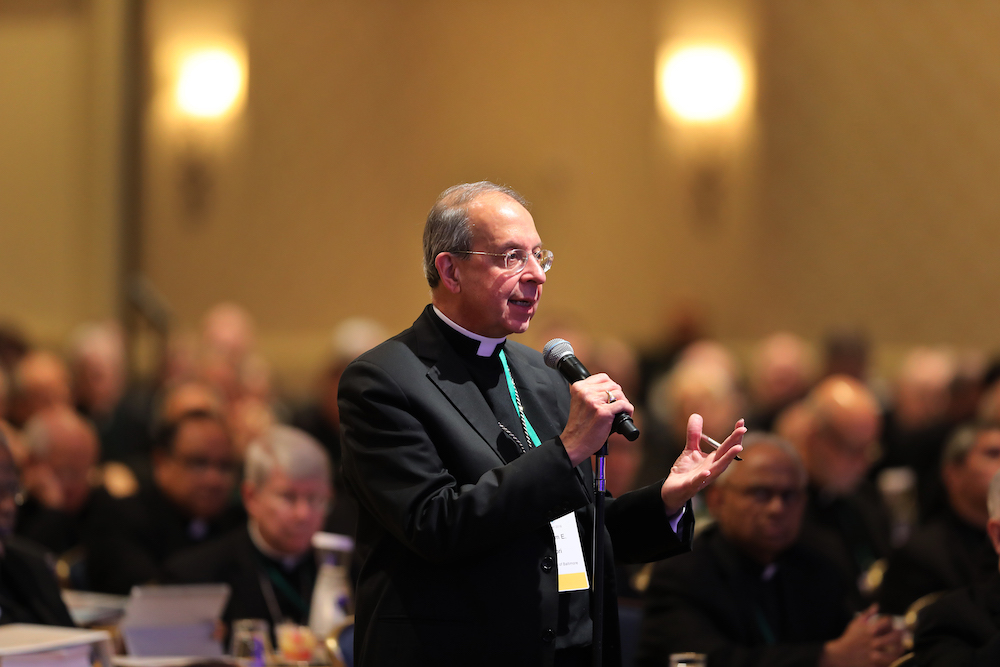The Archdiocese of Baltimore introduced Tuesday a third-party system for reporting allegations of abuse or misconduct against its archbishop and other bishops serving in the archdiocese.
“I pray this step and our continued commitment to child protection will send a clear message to the faithful of this local Church that abuse of any kind will not be tolerated and that those in positions of authority, namely bishops, will be held accountable for keeping the Church safe, especially for children and others who may be vulnerable,” Baltimore’s Archbishop William Lori told reporters Jan. 15.
“In this we hope to begin rebuilding the confidence of trust of those we serve, and the wider community.”
Lori is one of four bishops active in the Archdiocese of Baltimore. Bishops Adam Parker and Mark Brennan are auxiliary bishops of the archdiocese, and Bishop William Madden is a retired auxiliary bishop who is still active in the archdiocese, an archdiocesan spokesman told CNA.
The third-party reporting system is administered by Ethics Point, which also facilitates third-party whistleblower reporting in the Archdiocese of Baltimore for fraud, theft, workplace and school safety and harassment issues, and allegations of sexual misconduct by diocesan priests, deacons, employees, or volunteers.
Complaints made through the Ethics Point systems about bishops will be routed to Baltimore’s diocesan review board, a lay led panel that will be charged with reporting allegation to civil authorities and the apostolic nuncio, the pope’s diplomatic and administrative representative to the U.S.
The system does not facilitate complaints against bishops other than those active in the Archdiocese of Baltimore.
Lori told reporters that in 2002, when the U.S. bishops’ conference developed policies to address child sexual abuse by priests or deacons, “the nation’s bishops drew a line in the sand by establishing clear and consistent standards of accountability and transparency for priests, deacons and others working in the Church. Those standards are working and have contributed to increased scrutiny and accountability.
“Now it is time for the Church to establish similar consistent standards for bishops. Therefore, I have asked that the lay Independent Review Board serve as the direct recipient for any allegations of abuse or misconduct by a bishop serving in the Archdiocese of Baltimore.”
The archbishop said he had also asked the diocesan review to issue an annual report on the the archdiocese has handled abuse allegations.
“There must be a ‘zero tolerance’ policy and approach for dealing with any priest, bishop, employee or volunteer who violates their office and harms in any way a young person or adult. Moreover, the high-profile case of former Cardinal McCarrick makes clear that utmost accountability must be required of all, regardless of rank,” Lori said.
The announcement of the third-party reporting system comes one month before the Vatican will hold a summit on the sexual abuse of minors for bishops’ conference leaders from around the world. That meeting is not expected to produce specific policies on sexual abuse, but is expected to charge bishops to create policy on the national level.
The announcement comes two months after the U.S. bishops’ conference was stopped by the Vatican from voting on proposals that would have created a nationalized third-party whistleblower system for reporting allegations against bishops, and a lay-led independent commission for investigating those allegations. The Vatican said it had not had sufficient time to review the proposals ahead of the scheduled vote.
The Baltimore policy resembles some aspects of those proposed policies, although the diocesan review board would apparently not be charged with investigation allegations independently, and would instead forward them directly to Church authorities. The possibility of lay investigations of bishops has raised concern among some Catholics, who note that only the pope is empowered to investigate bishops regarding potential canonical offenses.
Lori, 67, has led the Archdiocese of Baltimore since 2012. In September 2018, the archbishop was also assigned to lead temporarily the neighboring Diocese of Wheeling-Charleston, West Virginia, and to investigate allegations of “sexual harassment of adults” against Bishop Michael Bransfield, who resigned from the diocese at that time.
The archbishop has for months called for lay involvement in addressing the Church’s sexual abuse crisis.
In August, he said that the anger, disillusion, or frustration of Catholics over the sexual abuse crisis “must be met with more than prayers and promises. They must also be met with action by any and all with responsibility for ensuring the safety of children and others in our care."
Laity must be a part of the solution to the Church’s sexual abuse crisis, he said, “for no longer can we expect the faithful to entrust this to the hierarchy, alone."

